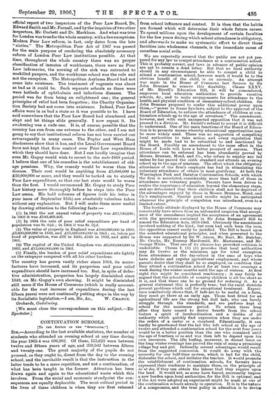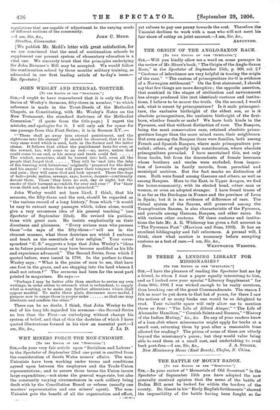CONTINUATION SCHOOLS.
[To TEE Earroa OF THE "SPECTATOR:"] SIRACCOrding to the last available statistics, the number of students who attended an evening school at any time during the year 1903-4 was 696,882. Of these, 155,623 were between twelve and fifteen years of age, and 359,503 between fifteen and twenty-one. The great majority of the pupils do not proceed, as they ought to, direct from the day to the evening school, and the inevitable result is that the instruction in the latter tends to be a mere repetition, and not a continuation, of "what has been taught in the former. Attention has been "drawn again and again to the educational waste which this involves. From the social and economic standpoint the con- sequences are equally deplorable. The most critical period in the lives of these children is when they are first released
from school influence and control. It is then that the habits are formed which will determine their whole future career. To spend millions upon the development of certain faculties for the few years during which school attendance is obligatory, and afterwards to make no systematic effort to direct those faculties into wholesome channels, is the immediate cause of countless social evils.
We are repeatedly assured that the public are not yet pre- pared for any law to compel attendance at a continuation school. This is probably correct, and laws in advance of public opinion are apt to remain a dead letter. But that no local authority should in any circumstances be able to compel a child to attend a continuation school, however much it would be to the obvious benefit of the child, is an anomaly. An attempt was made in the House of Commons last Session by Sir John Brunner to remove this disability. Clause XXXV. of Mr. Birrell's Education Bill, it will be remembered, empowers local education authorities to provide vacation schools, &c., and to make arrangements for attendance to the health and physical condition of elementary-school children. Sir John Brunner proposed to confer this additional power upon them,—" power to frame bye-laws, subject to the approval of the Board of Education, to enforce the attendance of children at con- tinuation schools up to the age of seventeen." The amendment, however, met with such unexpected opposition that it was not pressed to a division. Mr. Birrell's refusal to accept it is difficult to understand. One of the main functions of the Board of Educa- tion is to promote means whereby educational opportunities may be more widely used. There was no suggestion of compelling local authorities to take action, and every regulation that might be made had to be submitted to and sanctioned by the Board. Possibly an amendment to the same effect in the House of Lords will have a better prospect of success. That attendance can be enforced has been abundantly proved by Messrs. Brunner, Mond, and Co., who refuse to employ any lad unless he has passed the sixth standard and attends an evening school up to the age of nineteen. The effect which the obligatory attendance of the firm's employes has had in stimulating the voluntary attendance of others is most gratifying. At both the Winnington Park and Barnton Continuation Schools, with which the firm is associated, considerably more than half of those in attendance are voluntary pupils. Parents have been driven to realise the importance of education beyond the elementary stage, and are determined that their children shall not be deprived of the advantages enjoyed by those in Messrs. Brunner, Mond, and Co.'s employment. Similar good results might be anticipated wherever the principle of compulsion was introduced, even to a limited extent.
The hostile attitude displayed by the House of Commons may conceivably have arisen from an unfounded suspicion that accept- ance of the amendment implied the acceptance of an agreement with the provisions contained in Sir John Brunner's Bill to amend the Education Acts, 1870-1903. Obviously the amendment involved nothing of the kind; but even had such been the ease, the opposition cannot easily be justified. The Bill is based upon the soundest educational principles, and when presented to the House was supported by Sir W. Anson, Mr. Burt, Mr. Butcher, Mr. Crooks, Mr. Ramsay Macdonald, Mr. Masterman, and Mr. George White. That one of its clauses has provoked criticism is undeniable. Clause I. (1) (b) provides that local authorities may fix twelve as the minimum age for total exemption from attendance at the day-school in the case of boys who have definite and regular agricultural employment, and whose parents desire that they shall be so employed, on condition that they attend a continuation school for at least two evenings a week during the winter months until the age of sixteen. At first sight this might be considered reactionary ; it may fairly be argued that the school-life of country children is all too short as it is, and that there can be no ground for reducing it. As a general statement this is perfectly true ; but the rural districts present problems which call for exceptional treatment. Experi- ence conclusively shows that, if lads are to be useful on a farm, they must go there at an early age. Those best fitted for an agricultural life are the strong but dull lads, who can barely struggle through the standards, and are perforce kept at school for the maximum period. To retain them long after they have ceased to derive benefit from the school fosters a spirit of insubordination and a dislike of all authority which quickly find expression when they are under the orders of a carter or 9. shepherd. Educationally, it can hardly be questioned that the lad who left school at the age of twelve and attended a continuation school for the next four years would be in a better position than the one who remained until the age of fourteen or so and was then left to depend upon his own resources. The idle loafing, moreover, in dismal lanes on the long winter evenings has proved the ruin of many a promising village boy and girl. Indirectly several advantages would result from the suggested concession. It would do away with the necessity for any half-time system, which is bad for the child, dislocates the school, and irritates the teacher. It would promote the establishment of continuation schools, for farmers have expressed their readiness to maintain them, on the principle of do at des, if they can obtain the labour that they require upon the land. It would not, as some have feared, necessarily impose a new burden upon local authorities, for the Bill is optional, and if the Act were adopted an experiment might be made at one of the continuation schools already in operation. It is in the nature of a compromise, and the true policy in education is to devise
regulations that are capable of adjustment to the varying needs of different sections of the community.
—I am, Sir, &c., JOHN C. MEDD.
Stratton, Cire-ncester.
[We publish Mr. Medd's letter with great satisfaction, for we are convinced that the need of continuation schools to supplement our present system of elementary education is a vital one. We sincerely trust that the principles underlying Sir John Brunner's Bill may be accepted. We would follow the continuation school by three months' military training, as advocated in our first leading article of to-day's issue— En. Spectator.]











































 Previous page
Previous page